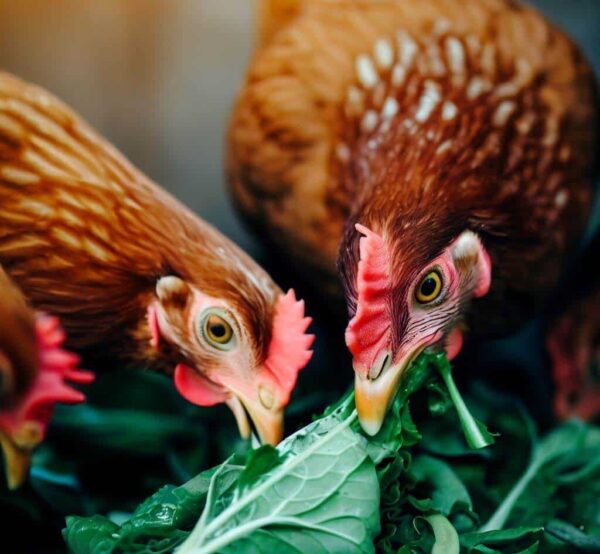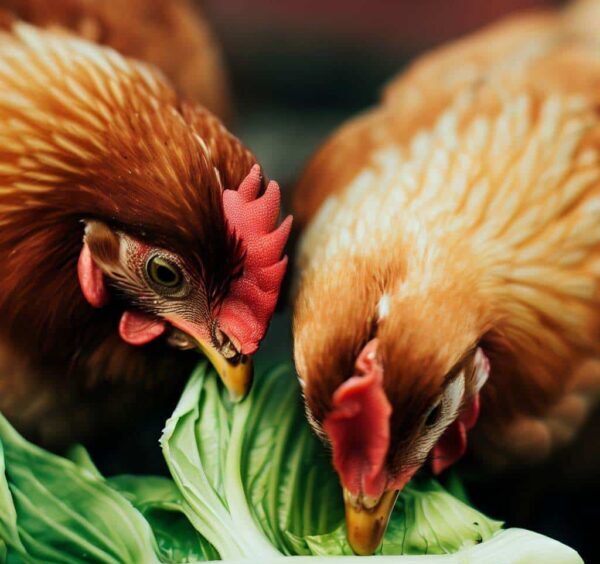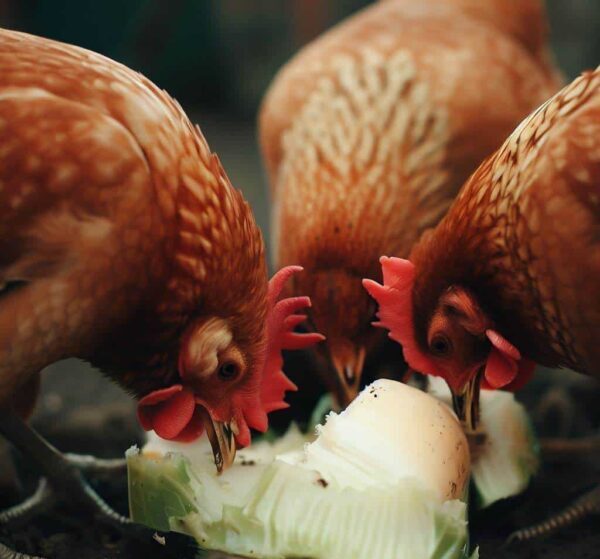Can Chickens Eat Mustard Greens? (Expert Advice)

You might be wondering, “Can Chickens Eat Mustard Greens?”. Chickens can eat mustard greens due to their high nutritional content.
Make sure to cut it into small pieces to prevent choking.
Topics Covered In This Article
What are Mustard Greens?

Mustard greens, derived from the leaves of the mustard plant (Brassica juncea), are leafy vegetables known for their peppery taste.
These greens go by various names, including brown mustard, vegetable mustard, Indian mustard, and Chinese mustard.
They belong to the Brassica vegetable group, including other nutritious members like bok choy, turnips, kale, collard greens, broccoli, and cauliflower.
Nutritional Content Of Mustard Greens
According to FoodData Central, A 100-gram serving of mustard greens contains (1)
| Name | Amount | Unit |
| Water | 90.7 | grams |
| Energy | 27 | kcal |
| Protein | 2.86 | grams |
| Carbohydrates | 4.67 | grams |
| Fiber, total dietary | 3.2 | grams |
| Calcium, Ca | 115 | milligrams |
| Iron, Fe | 1.64 | milligram |
| Magnesium, Mg | 32 | milligrams |
| Phosphorus, P | 58 | milligrams |
| Potassium, K | 384 | milligrams |
| Sodium, Na | 20 | milligrams |
When discussing the nutritional content of mustard greens, they truly pack a punch.
Loaded with essential vitamins and minerals, these greens can make a valuable addition to your chickens’ diet.
Mustard greens are also rich in vitamins A, C, E, K, and B6. According to the research done by PubMed Central the following are the benefits of vitamins A, C, E, K, and B6 for chickens.
- Vitamin A supports chickens’ immune systems and vision. (2)
- Vitamin C contributes to immune health and acts as a natural antioxidant. (3)
- Vitamin E supports overall well-being and affects skin and feather health. (3)
- Vitamin K aids in blood clotting and bone health. (4)
- Vitamin B6 is crucial for amino acid utilization and nerve function. Deficiency may lead to spasms and convulsions. (5)
Moreover, mustard greens contain vitamins B1, B2, and B3, each offering specific benefits.
Vitamin B1 helps prevent ruffled feathers and muscle paralysis, while vitamin B2 prevents curled-toe paralysis and diarrhea.
Vitamin B3 helps ward off issues like inflamed tongue, bow legs, and cavities in the mouth.
These greens also contain essential minerals such as calcium, phosphorus, iron, and potassium.
Benefits of Mustard Greens for Chickens
Vitamin B6 and Nerve Function
Vitamin B6, abundant in mustard greens, is essential for chickens.
It helps them properly utilize amino acids, which are the building blocks of proteins.
According to the animal studies done on PN-induced neuropathy by Felix Hadtstein and Misha Vrolijk, Vitamin B6 plays a crucial role in nerve function. (5)
A deficiency in this vitamin can lead to spasms and convulsions in chickens.
A Feathered Solution with Vitamin B1
Mustard greens’ vitamin B1 content is beneficial for chickens’ appearance.
It helps prevent ruffled feathers and muscle paralysis, ensuring that your chickens are healthy and look their best.
Curled-toe prevention with Vitamin B2
Vitamin B2 is vital for preventing curled-toe paralysis and diarrhea in chickens.
By including mustard greens in their diet, you contribute to their overall well-being and quality of life.
Vitamin B3 and Oral Health
Vitamin B3, present in mustard greens, aids in maintaining oral health.
It helps prevent issues like inflamed tongue, bow legs, and cavities in the mouth, ensuring your chickens can enjoy their meals without discomfort.
Nutrient-Rich Mustard Greens
Besides vitamins, mustard greens provide a wealth of minerals like calcium, phosphorus, iron, and potassium.
These minerals are crucial for various bodily functions, including bone health, blood circulation, and overall vitality.
Potential Parasite Prevention with Vitamin C
Mustard greens’ vitamin C content can play a role in preventing certain parasites.
While not a foolproof solution, incorporating vitamin C-rich foods into your chickens’ diet can contribute to their overall health and parasite resistance.
High Fiber Content for Digestion
The high fiber content in mustard greens supports healthy digestion in chickens.
Like humans, chickens benefit from fiber to keep their digestive systems functioning smoothly.
Natural Pest Repellant
Interestingly, mustard greens possess natural pest-repellent properties.
Including them in your chickens’ diet might offer some protection against common pests that bother your feathered companions.
Potential Drawbacks of Mustard Greens for Chickens
While mustard greens have numerous benefits, there are a few potential drawbacks.
These greens contain compounds called goitrogens, which can interfere with the proper functioning of the thyroid gland.
However, feeding mustard greens in moderation and a balanced diet is unlikely to cause issues.
How to Feed Mustard Greens to Chickens
Feeding mustard greens to your chickens can be a rewarding experience, but it’s essential to do so correctly.
- Wash the Greens First: Like with any other produce, wash the mustard greens thoroughly to remove dirt or residues.
- Chop Them Up: Chop the greens into smaller, manageable pieces. This makes it easier for your chickens to eat and digest them.
- Cooking vs. Raw: While chickens can eat raw mustard greens, cooking them slightly can help break down certain compounds and make them more palatable. Consider steaming or blanching them before serving.
Other Greens That Chickens Can Eat
Mustard greens are one of many options for your chickens.
You can also consider including other nutrient-rich greens like turnip greens, collard greens, and even Swiss chard in their diet.
Variety is key to providing a well-balanced and exciting menu for your flock.
- Kale
- Broccoli
- Lettuce
- Swiss chard
- Cucumbers
- Turnip Greens
- Collard Greens
- Carrot Tops
- Asparagus
- Radish Tops
In conclusion, the answer to “Can chickens eat mustard greens?” is a resounding yes.
Mustard greens offer many nutritional benefits, from essential vitamins to minerals contributing to chickens’ overall health and vitality.
By incorporating mustard greens into their diet, you’re taking a step towards ensuring your feathered friends lead happy and healthy lives.
FAQs
Mustard, in moderation, is generally safe for chickens. However, excessive consumption may lead to digestive issues. Always introduce new foods gradually and monitor your chickens for any adverse reactions.
Chickens should avoid consuming toxic greens like nightshades (tomatoes, potatoes, eggplants), rhubarb leaves, and avocado skins/pits. These can be harmful and even fatal to chickens.
Chickens can enjoy a variety of safe greens, such as lettuce, kale, spinach, dandelion greens, and collard greens. Remember to offer these in moderation alongside a balanced diet.
Yes, chickens can eat turnips and mustard greens. These leafy greens provide essential nutrients and can be a healthy addition to their diet. Just ensure they’re washed and offered in appropriate portions.
Sources
VeryWell Animals uses high-quality sources, such as scientifically reviewed studies in its articles. Discover our unique approach to fact-checking and ensuring our content remains accurate and trustworthy.
- Nutritional content of Mustard Greens – PubMed Central
- Pros and Cons of Dietary Vitamin A and Its Precursors in Poultry Health and Production: A Comprehensive Review – PubMed Central
- Centennial Review: Effects of vitamins A, D, E, and C on the chicken immune system – PubMed Central
- Vitamin K alleviates bone calcium loss caused by Salmonella Enteritidis through carboxylation of osteocalcin – PubMed Central
- Vitamin B-6-Induced Neuropathy: Exploring the Mechanisms of Pyridoxine Toxicity – PubMed Central
Last Updated on 20 October 2023
Waman Nuka is a seasoned wordsmith and a passionate animal enthusiast with decades of experience in the world of animal care. With a deep love for all creatures great and small, Waman’s journey in the realm of animals started as a young boy exploring the lush forests surrounding his childhood home.


